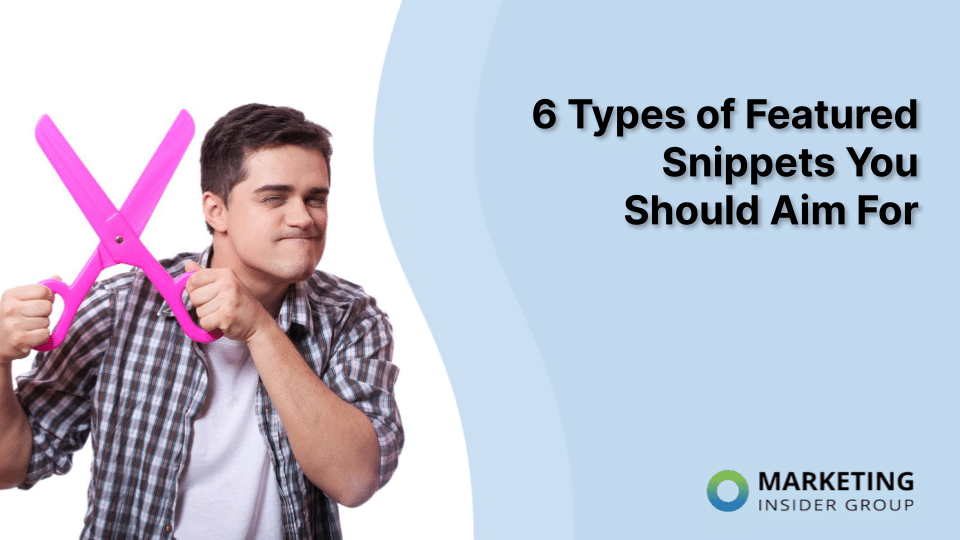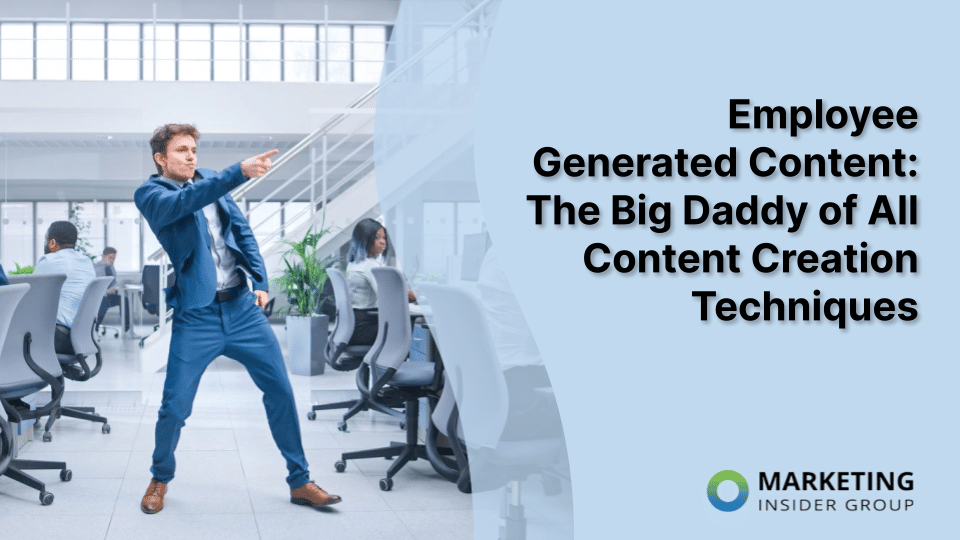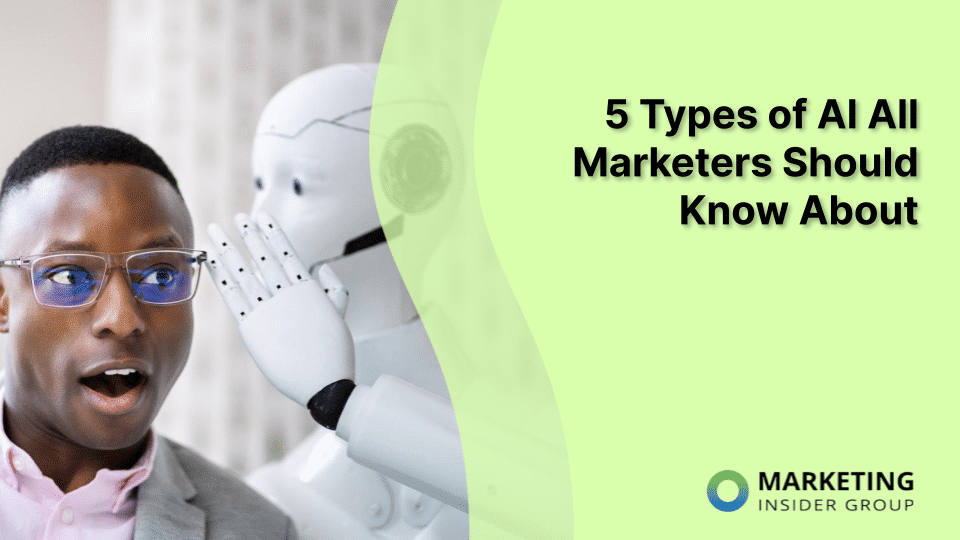
5 Types of AI All Marketers Should Know About
AI has caused a seismic shift in the marketing world over the past several years—and we’re talking about way more than ChatGPT. Today, AI is nearly as intertwined with marketing as traditional technology tools, like CRM systems and email marketing platforms. To stay ahead, it’s critical for marketers to know the different types of AI impacting the marketing world and how to use them in practice. That’s what we’ll cover in this article.
When you’re done reading, you’ll have an understanding of:
- AI’s evolution in the marketing world
- Top use cases for AI in marketing
- Types of AI marketers should know and understand
- How to achieve the right human/AI balance
Let’s dive in.
Quick Takeaways:
- There are many types of AI helping marketers scale and enhance traditional strategies.
- Popular use cases for AI include: personalization, sentiment analysis, predictive analytics, optimized advertising, and content generation.
- Types of AI every marketer should know are: machine learning, generative AI, natural language processing, conversational AI, and programmatic advertising.
- Nearly three-quarters of marketers now use AI to generate original content.
- AI is not a replacement for human marketers (and won’t be any time soon).
AI in the Marketing World: An Overview
AI’s History in Marketing
AI in marketing may be trending more than ever, but it’s not new to the 2020s. In fact, the first forms of it emerged in the 50s and 60s, when marketing began to use tools like linear programming and decision trees to optimize marketing and sales strategies.
But it really took off later in the 20th century throughout the 80s and 90s, as AI-powered data analytics became more sophisticated, and the rise of digital communication channels like email and online chat opened the door for marketing personalization at scale. From then to now, in 2023, AI in marketing has evolved at an increasingly accelerated pace.
And it’s only predicted to keep getting faster. According to Statista, as new AI tools and technologies in marketing are developed at a more rapid pace, its market value in the industry will reach $107B—nearly quadruple its current value.
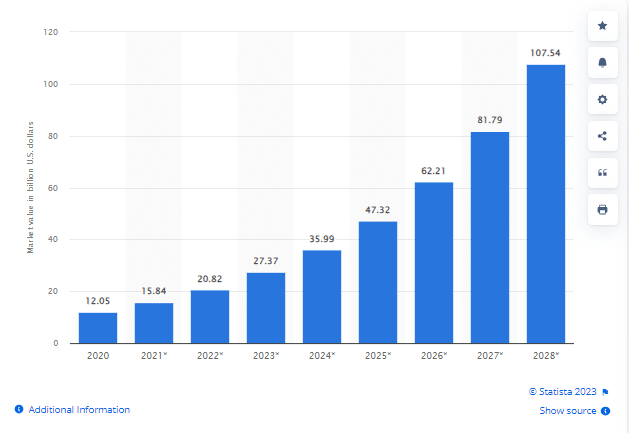
Image Source: Statista
The takeaway: AI in marketing is here to stay, which makes it more important than ever for marketers to understand the different types of AI and how to leverage them strategically.
How Marketers Use AI: 6 Important Use Cases
Personalization
If you’ve worked in marketing for even a day, you know personalization is an absolute must to win new customers in every industry across B2B and B2C. According to salesforce, more than 80% of consumers in both spaces say being treated like a person, not a number, is critical to winning their business.
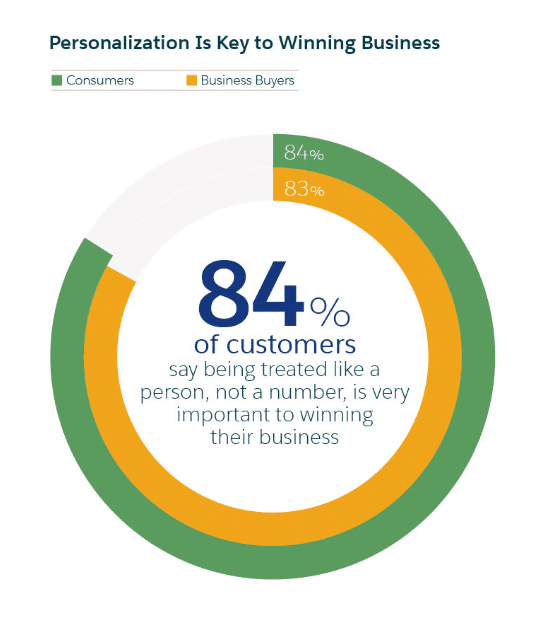
Image Source: Salesforce
You might be thinking: Can AI really personalize marketing communications in a way that feels genuine?
The answer is yes—no doubt.
AI is driving sophisticated personalization at scales not possible without it, allowing marketers to widen their reach without sacrificing the quality of their interactions. AI algorithms analyze user behavior and engagement patterns to tailor the entire buyer experience to their preferences.
These same tools deliver insights to human marketers who can use them to be more personal in their manual outreach, too.
Sentiment Analysis
Language-based AI technology enables marketers to analyze massive amounts of text content to see the sentiment behind it. This is critical for understanding how your products, services, and marketing content are all being perceived by your target audience.
For example: Using a language AI software tool, a marketer could analyze customer reviews and brand mentions across the web, using features that allow them to see patterns and trends around sentiment. It can be used to see how specific campaigns or product launches are received, or just to track overall brand sentiment over time.
Predictive Analytics
AI doesn’t just react; it predicts. In a marketing and business world that’s moving faster than ever, this is a really important capability to have in your arsenal. AI-powered analytics tools can analyze vast data sets to forecast trends, anticipate market shifts, recognize changing consumer behavior or sentiment, or identify emerging threats and opportunities.
With this type of AI tool in place, marketers ensure they can always stay one step ahead of their external environment—including competitors.
Optimized Advertising
Every marketing dollar counts. AI aids in this by continuously monitoring ad performance across platforms. If an ad isn’t resonating on one platform but is performing exceptionally well on another, AI tools can automatically reallocate the budget, ensuring optimal ad spend and maximum ROI.
Content Generation
We all know by now that much of the content we see online today is created by generative AI tools a la ChatGPT. Using AI to actually generate new content has gotten its fair share of criticism in the industry, but there’s no doubt that the capability is being used everywhere. While it has not yet proven ready to replace human writers, it’s becoming a powerful support tool to scale content creation.
5 Types of AI Marketers Need to Know About
So: Now that we’ve covered the evolution of AI in marketing and how it’s being used today, it’s time to dive into the specific types of AI every marketer should know about. For each type, you’ll find plenty of tools on the market to help you implement it. In this section, we’ll focus on the type of AI itself rather than specific products or platforms.
Machine Learning
Machine Learning (ML) is a subset of AI that teaches machines to learn from data. For marketers, ML can be the secret weapon in understanding customer behaviors. It can predict which leads are most likely to convert or even detect when a customer might churn.
By analyzing and learning from past data, ML models can do things like forecast pipeline activity, help to optimize pricing strategies, and continually improve lead targeting for higher conversions rates.
Generative AI
As we touched on already, generative AI can create new content on its own—and it’s not just text, either. ChatGPT might be writing articles, but tools like Artiphoria (and many more) are designing images, and there are even tools to compose original music. The possibilities start to feel endless when you consider these and potential other applications of generative AI.
Of course, of all the types of AI we cover here, this is the one that gets the most buzz. What does it mean for human creativity and originality?
For now, we’ll say this: Generative AI is not ready to replace human creators, and it’s not happening any time soon.
But stubbornly resisting it as a content creation support tool is a miss—and one that will likely put you behind competitors who are using it in their own strategies. Nearly three-quarters of marketers already use generative AI actively at their companies.
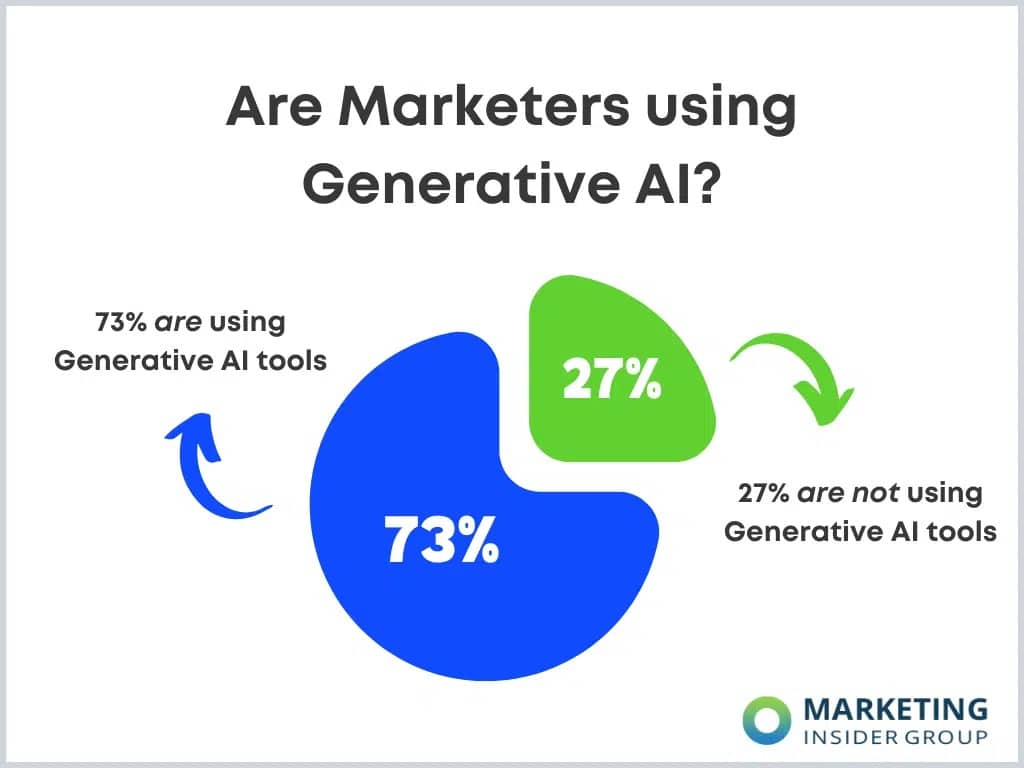
Plus, besides being a competitive necessity, generative AI helps you come up with new ideas, expand on your existing ones, find new resources, be more creative, scale the content creation process, and much more—all without losing the human element of the process.
Natural Language Processing
Natural language processing (NLP) is a type of AI that enables machines to understand, interpret, and generate human language. NLP is the technology behind voice assistants like Siri or Alexa.
For marketers, however, its capabilities go way beyond that. With NLP, marketers can gain qualitative customer insights that were previously impossible to extract at scale. It can be used to analyze customer feedback and monitor brand sentiment to stay ahead of potential issues, capitalize on opportunities, and continually improve strategy.
Conversational AI
Conversational AI is a technology that enables machines to simulate human-like conversations through text or voice interactions. In marketing, chatbots and virtual assistants are the stars of conversational AI.
They can offer 24/7 customer service, guide users through websites, or even help in lead generation by qualifying prospects.
With digital channels now the primary communication method for brands and customers, using conversational AI to engage audiences, especially new potential leads on your website, can massively increase pipeline growth potential.
Programmatic Advertising
Programmatic advertising automates the ad bidding process and leverages algorithms to drive smarter ad placement decisions. Instead of the traditional method of purchasing ad space, programmatic tools can bid on ads in real-time, targeting users more precisely.
This type of AI ensures that ads reach the right people at the right time, maximizing the return on advertising spend. It’s like having a virtual stock trader, but instead of trading stocks, it trades ad spaces.
Achieving the Right Human/AI Balance
It’s important to note that integrating the types of AI we covered in this article into your marketing strategy doesn’t render human participation obsolete. The opposite is actually true. AI amplifies human creativity and intuition.
While AI can analyze data and offer insights, it’s human marketers who bring understanding of cultural nuances, emotional intelligence, and creative strategy to the table.
For example: AI can provide an array of design options, but the decision on which design captures the spirit of the brand and campaign still relies on the human marketing team.
Plus, with every innovation in AI, ethical considerations become more paramount. AI-driven tools, while powerful, need human oversight to ensure they align with a brand’s values.
In short: AI presents an exciting frontier for marketers. But it’s best to use it as a tool for enhancing and scaling marketing tactics rather than replacing any humans behind the strategy.
How Marketing Insider Group Can Help
The team at Marketing Insider Group pairs cutting-edge AI tools with talented human writers to deliver optimized content tailored to each client’s unique audience. Schedule a quick call with me to learn more about how we do it.

